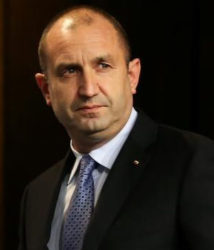SOFIA, (Reuters) – Bulgarian Socialist ally Rumen Radev, a Russia-friendly newcomer to politics, won yesterday’s presidential election by a wide margin, exit polls showed, prompting centre-right Prime Minister Boiko Borisov to pledge to resign.

Radev, 53, entered Bulgarian politics on a wave of discontent with the ruling centre-right’s progress in combating corruption, disappointment with the European Union and concerns among voters over alienating an increasingly assertive Russia. A former air force commander, Radev has argued Bulgaria needs to be pragmatic in balancing the requirements of its European Union and NATO memberships while seeking ways to benefit from a relationship with Moscow. Exit polls showed Radev, who is backed by the opposition Socialist party, winning 58.1-58.5 percent of the vote, compared with 35.3-35.7 percent for Tsetska Tsacheva, the 58-year-old candidate of the ruling GERB party. Compounding GERB’s problems, Tsacheva was seen as lacking Borisov’s charisma.
“The loss of GERB is definite and clear,” Borisov told reporters after exit polls were published. “In this election, the people showed us that something is not as it should be. That our priorities may be good, but obviously there are better ones. So the most democratic thing, the right thing to do is to (resign),” he said. Borisov’s resignation would likely lead to an early election as soon as March and could be followed by months by difficult coalition talks among several political groupings.
“There isn’t an alternative to take over government,” said political analyst Ognian Minchev.
“The Socialists and the ethnic Turkish MRF party have lost much of their public trust only two years ago…Early elections are inevitable,” he said.







